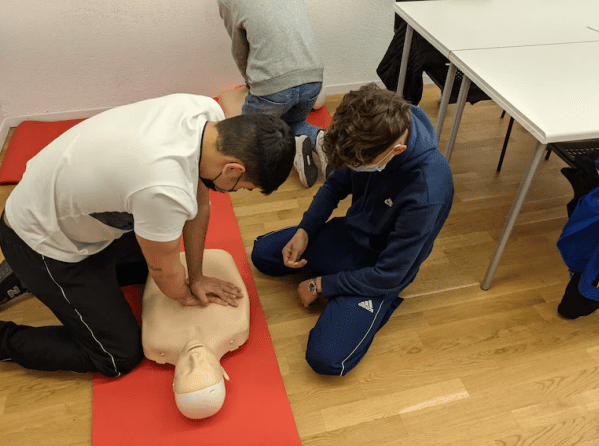Trauma is something that can leave scars on a person. When affected by a serious accident or perhaps a cardiac event, the person may develop mental complications because of what they went through. While the affected person does suffer, it’s important to understand that those witnessing the trauma can be affected just as much. Trauma can have a domino effect, causing serious complications for the loved ones too. In this post, we take a closer look at how witnessing trauma can affect a person.
The Death Of A Loved One And Trauma
It is estimated that almost 700,000 individuals died from heart-related events in 2021, accounting only for the American population. Cardiovascular events are responsible for up to 20% of deaths in the country. When a patient experiences an event such as cardiac arrest, intervention can often save a life, but it’s not always possible, especially in cases where appropriate protocols are not followed at a very early stage.
Cardiac arrests alone are estimated to contribute to up to 450,000 deaths annually among Americans. When someone loses a loved one after witnessing the trauma they went through, it can take a toll on their mental health.
Some of the potential complications that can come with trauma after witnessing the death of
a loved one may include:
● Posttraumatic stress symptoms
● Depression
● Anxiety
● Panic disorders
Disability And Serious Injury Affecting Witnesses
It is not only death that can cause a traumatic experience for more than the affected person.
Imagine a situation where a family is involved in a motor vehicle accident. While all involved
members survive, one member of the family, such as the father, now faces disability due to a
traumatic injury they suffered.
The wife and children in this particular scenario would also be traumatized. Not only may
they start to experience posttraumatic stress symptoms due to the accident itself, but they
can go on to develop depression and other mental problems when considering the impact
that the event had on the father.
While we do not want to imagine ourselves in this type of situation, it is something that can
happen at any time. This is why it is important for healthcare professionals to be considerate
and to understand the fact that more than just an affected patient can experience an impact
from trauma.
Researchers explain that trauma-informed care needs to be delivered to individuals in both
cases of one-time and repetitive traumatic events. It is also advised that healthcare
professionals need to understand that not everyone will show clear signs of post-traumatic
stress disorder. There are individuals who are more resilient, but they are still affected by
these events.
Reconfirming The Importance Of Early Cardiac Event Intervention

When it comes to savings the lives of people in critically ill conditions and those affected by
serious injuries, it is important to understand the role that early intervention plays.
Discussing trauma affecting witnesses once again reconfirms the important role that these
early protocols play, as they can significantly increase the chances of survival.
Lorem ipsum dolor sit amet, consectetur adipiscing elit. Ut elit tellus, luctus nec ullamcorper mattis, pulvinar dapibus leo.
Statistics show that up to 90% of people who have a cardiac arrest outside a hospital setting
do not make it. The death of these individuals is often recorded merely minutes after the
cardiac event.
Both inside and outside the hospital, the ability of first responders to get on the scene
without delay can matter when it comes to saving a person’s life. By addressing the urgency
of early intervention and the use of advanced cardiac life support strategies, it is possible to
reduce the prevalence of deaths due to these events.
This also includes ensuring healthcare professionals, including EMTs, are educated on the
signs of problems like cardiac arrest. When the signs are recognized early on, interventions
can help to prevent death.
When the necessary measurements are in place, it could help to reduce the trauma related
to losing a loved one, as programs like ACLS can essentially save lives when the
appropriate medical staff members have these skills.
Facilities can utilize online course providers, such as AffordableACLS, to help them get
started with an ACLS (Advanced Cardiac Life Support) certification. This would equip
individuals in various settings, both in and out of the hospital, with the life-saving skills
required to respond to cardiac and other events among patients.
When healthcare professionals in the facility have the knowledge related to advanced
cardiac life support, it’s easier to ensure they respond quickly and without delay when a
patient enters a condition that requires their skills.
Conclusion
When someone witnesses trauma, even if it doesn’t affect them initially, , it can still have a
negative impact on their mental health. From posttraumatic stress to the development of
depression, it’s important to give recognition to these adverse effects. This can help to
create a more innovative approach to providing support to all individuals who are affected by
these events.
References
Heart Disease Facts. Centers for Disease Control and Prevention. https://www.cdc.gov/heart-disease/data-research/facts-stats/index.html
S. Coelho. What Is Traumatic Grief? PsychCentral. Published 25 January 2022. https://psychcentral.com/health/traumatic-grief
Understanding the Impact of Trauma. Trauma-Informed Care in Behavioral Health Services.
Published 2014. https://www.ncbi.nlm.nih.gov/books/NBK207191/
What Is Cardiac Arrest? National Heart, Lung, and Blood Institute. https://www.nhlbi.nih.gov/health/cardiac-arrest











